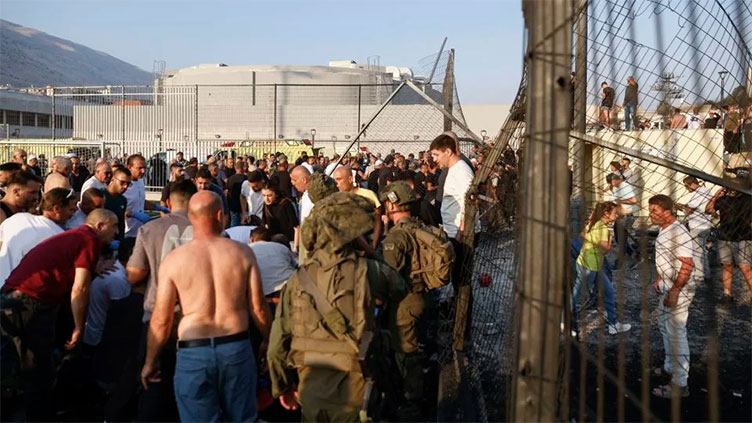Lebanon braces for Israeli retaliation after deadly Golan Heights strike

World
Israel's security cabinet authorised a military response to the weekend rocket attack from Lebanon.
BEIRUT (Lebanon) (AFP) – Lebanon braced on Monday for a possible large-scale counterstrike after Israel's security cabinet authorised a military response to the weekend rocket attack from Lebanon that killed 12, all teenagers and children. Diplomats engaged in extensive last-minute diplomatic efforts to avert a full blown war between Israel and Hezbollah.
Israeli Prime Minister Binjamin Netanyahu on Monday vowed a "severe" response to a deadly strike that killed youths in the annexed Golan Heights, as diplomats raced to contain escalation between Israel and Hezbollah.
On a visit to the site of the rocket strike which killed 12 children in the town of Majdal Shams, Netanyahu said: "The State of Israel will not, and cannot, let this pass. Our response will come and it will be severe."
He was greeted by protests during the visit, which came after mourners gathered in the Druze Arab town to bury the last victim, 11-year-old Guevara Ibrahim.
Israel and the United States have blamed the strike on Lebanon's Iran-backed Hezbollah movement, which has traded near-daily fire with Israeli forces since war in Gaza began between Hamas militants and Israel in early October.
Lebanese Foreign Minister Abdallah Bou Habib said a flurry of diplomatic activity has sought to contain the anticipated Israeli response.
"Israel will escalate in a limited way and Hezbollah will respond in a limited way... These are the assurances we've received," Bou Habib said in an interview with local broadcaster Al-Jadeed.
Several analysts told AFP that this was likely to be the case, with Israel wary of having to fight wars on two fronts.
The United States, France and others were trying to contain the escalation, Habib added, while Lebanese Prime Minister Najib Mikati said "talks are ongoing with international, European and Arab sides to protect Lebanon and ward off dangers".
On Monday White House National Security Council spokesman John Kirby said he was "confident" a broader war could be avoided.
Iran's new President Masoud Pezeshkian, whose country supports Hezbollah and Hamas, warned Israel against attacking Lebanon, which he said would be "a great mistake with heavy consequences".
Pezeshkian spoke with French President Emmanuel Macron on Monday, with the Elysee Palace saying Macron told his counterpart "all must be done to avoid a military escalation" and urged Tehran to "cease its support for destabilising actors".
Hezbollah has denied responsibility for the Majdal Shams rocket attack, though the group claimed multiple strikes on Israeli military positions that day.
Israel said Hezbollah fired a Falaq-1 Iranian rocket. This type of projectile is unguided and an analyst called them inaccurate weapons.
GAZA BATTLES
On Sunday, Israel's security cabinet "authorised the prime minister and the defence minister to decide on the manner and timing of the response", Netanyahu's office said.
Hezbollah has evacuated some positions in south and east Lebanon, a source close to the group told AFP.
On Monday, Hezbollah said it had launched "dozens of Katyusha rockets" at an Israeli military site following the killing of two of its fighters.
The group later claimed additional strikes against military positions in Israel's north. Official Lebanese media said a Syrian national died from wounds after an Israeli drone strike in southern Lebanon.
The cross-border violence has already killed more than 500 people in Lebanon, most of them fighters, and dozens of civilians and soldiers on the Israeli side.
Hezbollah has said its attacks are in support of Hamas, and they would stop if a ceasefire is reached in Gaza, where war began on October 7 when the Palestinian militants attacked southern Israel.
Months of effort have failed to secure a ceasefire and hostage release deal, though mediators and Israeli negotiators met on Sunday in Rome to discuss the latest proposal.
"The negotiations on the main issues will continue in the coming days," an Israeli statement said.
Hamas, however, again accused Netanyahu of hindering negotiations. In a statement, the group said he has set new conditions in "a retreat" from an earlier draft.
On the ground in Gaza, the Israeli military said its forces were continuing "precise" operations in the Rafah area and in nearby Khan Yunis, where troops had "eliminated dozens of terrorists".
Israeli aircraft struck 35 targets across Gaza in 24 hours, the military added.
In the territory's north, Hamas's armed wing said its fighters were "engaging" Israeli troops in Gaza City's Tal al-Hawa district, where witnesses reported shelling.
SOLDIERS DETAINED
The Hamas attack on southern Israel that started the war resulted in the deaths of 1,197 people, mostly civilians, according to an AFP tally based on official Israeli figures.
Militants also seized 251 hostages, 111 of whom are still held captive in Gaza, including 39 the military says are dead.
Israel's retaliatory military campaign in Gaza has killed at least 39,363 people, according to the health ministry in the Hamas-run territory, which does not provide details on civilian and militant deaths.
Since the war began, rights activists, UN agencies and others have alleged abuses of Palestinians during Israeli detention. On Monday, Israel's military said nine soldiers are being held for questioning in a case of suspected abuse of a detainee at a facility known to be holding Palestinians arrested from Gaza.
Late on Sunday, the military announced its latest evacuation order for parts of central Gaza, asking Palestinians to head to a declared safe zone near Khan Yunis.
It said Israeli forces would "operate forcefully" against militants in the area of Al-Bureij refugee camp after rocket fire from there.
Hundreds were fleeing the area on Monday, witnesses said.
Philippe Lazzarini, head of the United Nations agency for Palestinian refugees, UNRWA, said "only 14 percent" of areas in Gaza are not under Israeli evacuation orders.


